五年级下册英语知识点总结
部编版五年级下册英语:英语第二单元知识点总结
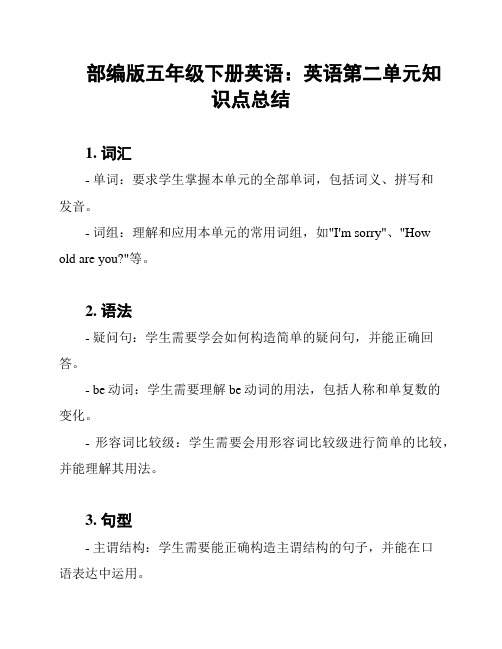
部编版五年级下册英语:英语第二单元知
识点总结
1. 词汇
- 单词:要求学生掌握本单元的全部单词,包括词义、拼写和
发音。
- 词组:理解和应用本单元的常用词组,如"I'm sorry"、"How old are you?"等。
2. 语法
- 疑问句:学生需要学会如何构造简单的疑问句,并能正确回答。
- be动词:学生需要理解be动词的用法,包括人称和单复数的
变化。
- 形容词比较级:学生需要会用形容词比较级进行简单的比较,并能理解其用法。
3. 句型
- 主谓结构:学生需要能正确构造主谓结构的句子,并能在口
语表达中运用。
- There be句型:学生需要理解There be句型的用法,并能正确运用。
- 祈使句:学生需要学会构造简单的祈使句,如"___."等。
4. 对话与口语表达
- 学生需要能够熟练进行日常对话,如问候、自我介绍、问年龄等。
- 学生需要掌握常用口语表达,如道歉、请求帮助、询问问题等。
5. 阅读理解
- 学生需要能够理解简短的阅读材料,并能回答相关问题。
- 学生需要通过阅读培养对英语语感和理解能力。
以上是部编版五年级下册英语第二单元的知识点总结。
希望同学们能够认真研究,并运用所学知识进行实践,提高英语水平。
人教版五年级下册英语第一单元知识点总结
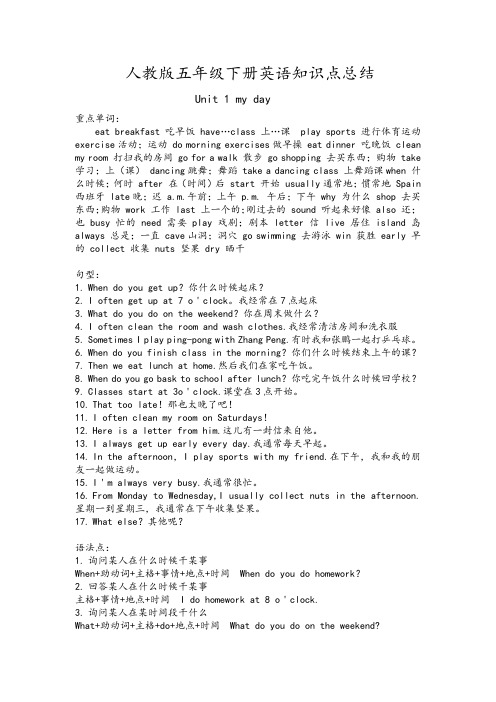
人教版五年级下册英语知识点总结Unit 1 my day重点单词:eat breakfast吃早饭 have…class上…课 play sports进行体育运动exercise活动;运动 do morning exercises做早操 eat dinner 吃晚饭 clean my room 打扫我的房间 go for a walk 散步 go shopping 去买东西;购物 take 学习;上(课) dancing跳舞;舞蹈 take a dancing class 上舞蹈课when 什么时候;何时 after 在(时间)后 start 开始 usually通常地;惯常地 Spain 西班牙 late晚;迟 a.m.午前;上午 p.m. 午后;下午 why 为什么 shop 去买东西;购物 work 工作 last 上一个的;刚过去的 sound 听起来好像 also 还;也 busy 忙的 need 需要 play 戏剧;剧本 letter 信 live 居住 island 岛always 总是;一直 cave山洞;洞穴 go swimming 去游泳 win 获胜 early 早的 collect 收集 nuts 坚果 dry 晒干句型:1.When do you get up?你什么时候起床?2.I often get up at 7 o'clock。
我经常在7点起床3.What do you do on the weekend?你在周末做什么?4.I often clean the room and wash clothes.我经常清洁房间和洗衣服5.Sometimes I play ping-pong with Zhang Peng.有时我和张鹏一起打乒乓球。
6.When do you finish class in the morning?你们什么时候结束上午的课?7.Then we eat lunch at home.然后我们在家吃午饭。
(完整版)小学五年级英语下册知识点归纳总结.doc

英语下册知识点总结一、重点短1. look at 看一看2. over there 在那3. in English 用英4. excuse me 打了5. in the pond 在池塘里6. play with 和⋯一起玩7. of course 当然8. swim well 游泳好9. pet shop 物店10. a lot of 很多11. jump through a ring 越12. ride a horse 13. ride a bike 自行14. climb up a ladder 爬梯子15. come here 来16. come along 来17. come with me 跟我来18. show⋯ around ⋯参19. this way 走20. borrow ⋯ from 从⋯借21. borrow books 借22. read stories 故事23. make things 制作西24. speak English 英25. draw pictures 画画26. have art classes上美27. dance room 舞蹈教室28. how often 多久一次29. science lab 科学室30. language lab 音室31. how many 多少32. other activities 其他活33. do experiments 做34. do listening 听力35. observe things 察事物36. do speaking 口37. New Year’s Day元旦38. meeting hall 会大39. Children ’s Day儿童40. be good at 擅41. be interested in ⋯感趣42. music club 音俱部43. no one 没有人44. play the violin 拉小提琴45. art club 美俱部46. come into 入47. listen to music 听音48. cut out 剪下49. come from 来自50. up and down 上上下下51. in groups 成52. science corner 科学角53. group work 小活 54. do project work 做目制作55. art corner 美角56. computer corner 角57. play football 踢足球58. be famous for 因⋯名 59. study plants and animals 研究植物60. do exercises 做运61. on the field 在操上62. do printing on the paper 在上印刷63. how about ⋯怎么?64.go on field trips 田野考察65. play volleyball 打排球66. play basketball 打球67. play hockey 打曲棍球68. play rugby 打橄球69. in the forest 在森林里70. have a look at 看一看71. here you are 你72. how much 多少()73. a pair of 一双;一74. try on 穿75. shoe shop 鞋店76. clothes shop 服装店77. make a shopping list 做物78. sports shop 体育用品商店79. cake shop 蛋糕店80. pay for 付81. feel well 感好82. see a doctor 看医生83. take good care of 好好照84. have a bad cold 得了重感冒85. have a fever 86. have a stomachache胃疼87. have a headache 疼88. have a toothache牙疼89. have a cough 咳嗽90. go to a concert 听音会91. do maths problems 做数学92. go to the music club 去音俱部93. have to 不得不94. stay in bed 待在床上95. get well 康复96. be worried about 担心97. don’t worry担心98. help⋯with帮助⋯做某事99. in the hospital 在医院里二、重点短解1. play with 和⋯一起玩play with sb.(某人 ) 和⋯一起玩play with sth.(某物 ) 玩某物e.g. Lucy and Lily are playing with their mother.Lucy and Lily are playing with their doll.2. a lot of 很多a lot of = lots of + 可数名复数或不可数名e.g. 同句There are a lot of apples on the table. = There are ______ ______ apples on the table. 答(案: lots of)3.how often 多久一次how often 是一个特殊疑,就率提。
人教版五年级下册(英语Unit 2) 知识点总结

Unit2My favourite season一、重点单词1.春天spring2.夏天summer3.秋天autumn/fall4.冬天winter5.季节season6.去野餐go on a picnic7.摘苹果pick apples8.堆雪人make a snowman9.去游泳go swimming10.因为because11.做得好good job12.哪一个which13.暑假summer vacation/holiday14.落下;秋天fall15.可爱的;美丽的lovely16.孩子们(复数)children17.最;最高程度地best18.看……look at19.天气weather20.在雪中玩play in the snow21.种花plant flowers22.吃冰激凌eat ice cream23.叶子leaf(复数leaves)24.许多lots of/a lot of25.家庭family26.到处everywhere27.热的hot二、重点句子1.Do you like the music,children?孩子们,你们喜欢这首音乐吗?2.–Which season do you like best?你最喜欢那个季节?–I like spring best.There are beautiful flowers everywhere.我最喜欢春天。
(因为)到处都有美丽的花。
3.Spring is green with flowers and songs.Summer is hot and the days are long.Autumn is golden and farmers are busy.Winter is white and the year is gone.春天花红柳绿歌声扬。
夏天炎热白昼长。
秋天金色农民忙。
冬天白色年已终。
(歌谣句子可选用于写作)4.The weather is good and the colours are beautiful!天气很好,色彩很美丽!5.I like summer,but I can’t swim.我喜欢夏天,但是我不会游泳。
冀教版小学英语五年级下册知识点总结
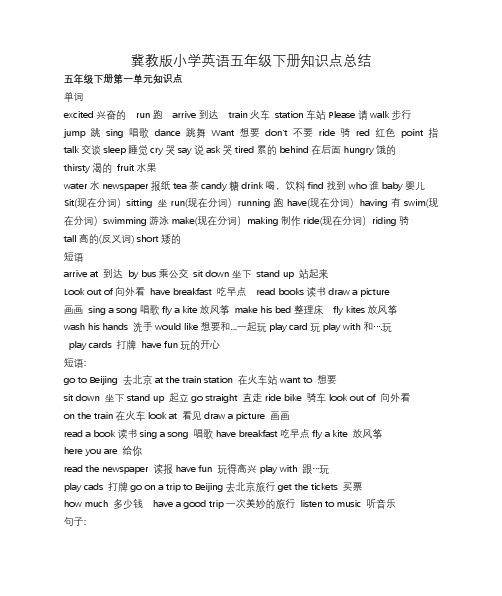
冀教版小学英语五年级下册知识点总结五年级下册第一单元知识点单词excited兴奋的run跑arrive到达train火车station车站Please请walk步行jump跳sing唱歌dance跳舞Want想要don't不要ride骑red红色point 指talk交谈sleep睡觉cry哭say说ask哭tired累的behind在后面hungry饿的thirsty渴的fruit水果water水newspaper报纸tea茶candy糖drink喝,饮料find找到who谁baby婴儿Sit(现在分词)sitting 坐run(现在分词)running跑have(现在分词)having有swim(现在分词)swimming游泳make(现在分词)making制作ride(现在分词)riding骑tall高的(反义词) short矮的短语arrive at 到达by bus乘公交sit down坐下stand up 站起来Look out of向外看have breakfast 吃早点read books读书draw a picture画画sing a song唱歌fly a kite放风筝make his bed整理床fly kites放风筝wash his hands 洗手would like想要和...一起玩play card玩play with和….玩play cards 打牌have fun玩的开心短语:go to Beijing 去北京at the train station 在火车站want to 想要sit down 坐下stand up 起立go straight 直走ride bike 骑车look out of 向外看on the train在火车look at 看见draw a picture 画画read a book读书sing a song 唱歌have breakfast吃早点fly a kite 放风筝here you are 给你read the newspaper 读报have fun 玩得高兴play with 跟…玩play cads 打牌go on a trip to Beijing去北京旅行get the tickets 买票how much 多少钱have a good trip一次美妙的旅行listen to music 听音乐句子:1.Please don’t jump!不要跳2.A:What are you doing ?你在干什么?B:I’m reading a book.我正在读书。
完整版)陕旅版五年级下册英语知识点总结
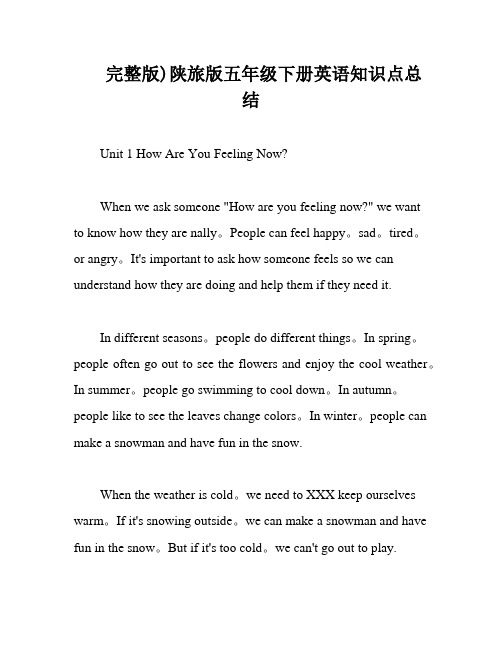
完整版)陕旅版五年级下册英语知识点总结Unit 1 How Are You Feeling Now?When we ask someone "How are you feeling now?" we wantto know how they are nally。
People can feel happy。
sad。
tired。
or angry。
It's important to ask how someone feels so we can understand how they are doing and help them if they need it.In different seasons。
people do different things。
In spring。
people often go out to see the flowers and enjoy the cool weather。
In summer。
people go swimming to cool down。
In autumn。
people like to see the leaves change colors。
In winter。
people can make a snowman and have fun in the snow.When the weather is cold。
we need to XXX keep ourselves warm。
If it's snowing outside。
we can make a snowman and have fun in the snow。
But if it's too cold。
we can't go out to play.If someone looks sad。
we should ask them why and try to help them feel better。
外研版(三起)小学英语五年级下册知识点归纳总结

外研版(三起)小学英语五年级下册知识点归纳总结Module 1一、音标ai —— [eɪ] —— rain, main, wait al —— [ɔ:] —— walk, talk, tallar —— [eɪ] —— farmer, far, park, party ay —— [eɪ] —— play, may, day, sayau —— [ɔ:] —— autumn, August, author ar —— [ɔː] —— warm, quarter, war二、单词still 还,仍然 programme (电视或广播)节目 lady 女士,夫人 life 生活 write 写different 不同的 ago 以前 interviewer 采访者 enough 足够的 television 电视机grandchildren (grandchild的复数形式)(外)孙子;(外)孙女 change 改变,变化night 夜晚,夜间 work 工作;劳动;干活儿 field 田地 fire 火,炉火 radio 收音机or (用于否定句中)也不,也没 telephone 电话 couldn't = could not 不能 hope 希望三、固定搭配live in 住在......watch TV 看电视a small village 一个小村庄talk about 谈论in the fields 在田地里last night 昨天晚上every day 每天enough food 足够的食物lots of 许多a television programme 一个电视节目四、句子1. There are two beautiful cats on the chair. 有两只漂亮的小猫在椅子上。
2. Life was very different in China many years ago. 在许多年前中国的生活对于现在有着很大的区别。
部编版五年级下册英语第二单元知识点总结
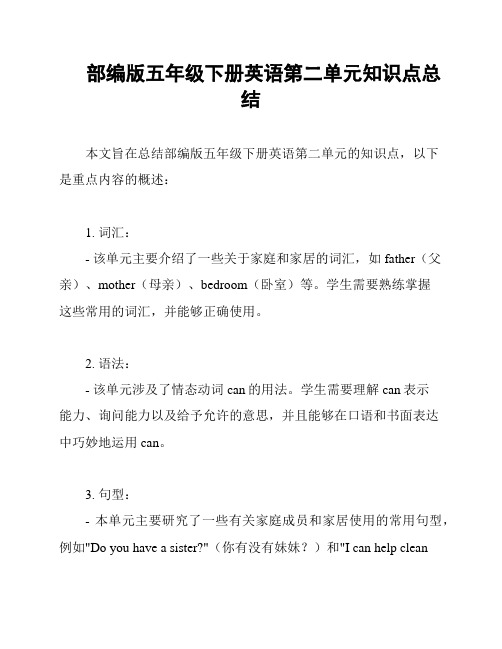
部编版五年级下册英语第二单元知识点总结本文旨在总结部编版五年级下册英语第二单元的知识点,以下是重点内容的概述:1. 词汇:- 该单元主要介绍了一些关于家庭和家居的词汇,如father(父亲)、mother(母亲)、bedroom(卧室)等。
学生需要熟练掌握这些常用的词汇,并能够正确使用。
2. 语法:- 该单元涉及了情态动词can的用法。
学生需要理解can表示能力、询问能力以及给予允许的意思,并且能够在口语和书面表达中巧妙地运用can。
3. 句型:- 本单元主要研究了一些有关家庭成员和家居使用的常用句型,例如"Do you have a sister?"(你有没有妹妹?)和"I can help cleanthe bedroom."(我可以帮忙打扫卧室。
)等。
学生需要掌握这些句型的用法,以能够流利地进行日常交流。
4. 对话:- 本单元的对话围绕家庭生活展开,通过对家庭成员的介绍和家庭活动的讨论来提升学生的口语能力。
学生需要理解对话内容,并能够模仿对话情景进行练。
5. 阅读理解:- 该单元的阅读理解内容涉及家庭、家居和日常生活方面的短文,通过理解短文来培养学生的阅读理解能力。
学生需要读懂短文并回答问题,同时可以通过阅读短文扩展自己的英语词汇和句式运用能力。
总结:以上是部编版五年级下册英语第二单元的重点知识点概述。
学生在研究这一单元时,应该注重词汇的掌握、语法的理解、句型的应用、对话的模仿和阅读理解能力的提升。
只有在综合掌握这些知识点的基础上,学生才能够有效地提升自己的英语能力。
- 1、下载文档前请自行甄别文档内容的完整性,平台不提供额外的编辑、内容补充、找答案等附加服务。
- 2、"仅部分预览"的文档,不可在线预览部分如存在完整性等问题,可反馈申请退款(可完整预览的文档不适用该条件!)。
- 3、如文档侵犯您的权益,请联系客服反馈,我们会尽快为您处理(人工客服工作时间:9:00-18:30)。
五年级下册英语知识点总结1 eat breakfast吃早餐 have···class上···课 play sports 进行体育运动
exercise 活动,运动 do morning exercises早锻炼 eat dinner吃晚饭 clean my room 打扫我的房间 go for a walk 散步 go shopping 去购物 take学习,上(课) dancing舞蹈 take a dancing class 上舞蹈课 a.m上午 p.m.下午 usually 通常地 二、 其他日常活动。 get up起床 eat lunch吃午饭 go to bed 上床睡觉 wash my face洗脸 wash my clothes 洗我的衣服 watch TV看电视 play ping-pong打乒乓球 play the pipa弹琵琶 go swimming 去游泳 go running去跑步 do homework 做作业 do kungfu练武术 play football踢足球 play basketball打篮球 三、频度副词。 always总是,一直(100%) usually通常(80%) often经常(60%) sometimes(30%)有时
四、疑问词。 when什么时候 why 为什么 五、重点句型。 1、询问别人什么时候做某事的句型及回答。 句型结构:问:When do you+动词短语原形+其他?(你/你们什么时候做某事?) 答:I/we(+频度副词)+动词短语原形+at+具体时间(我/我们通常在几点做某事。)
例:问:When doyou go to bed?(你什么时候上床睡觉?) 答:I go tobed at 9:00p.m (我晚上9点上床睡觉。) 注意:当主语是第三人称单数(he,she,it,单个人名或单数名词)时,助动词do要变成does,
句型结构是:when does+主语(第三人称单数)+动词短语原形+其他? 2、询问别人周末做什么的句型及回答。 句型结构:问:What do you do on the weekend?(你周末做什么?) 答:I(+频度副词)+动词(短语)+其他。 例:问:What doyou do on the weekend?(你周末做什么?) 答:I usually read books. (我通常看书。) 注意:当主语是第三人称单数(he,she,it,单个人名或单数名词)时,助动词do要变成does,
句型结构是:what does+主语(第三人称单数)+do+on the weekend? 五年级下册英语知识点总结2 第一单元知识点 一、主要单词: do morning exercises 晨练,做早操 eat breakfast吃早饭 have English class上英语课 play sports进行体育活动 eat dinner吃晚饭 eat lunch吃午饭 climb mountains 爬山 go shopping购物,买东西 play the piano 弹钢琴 visit grandparents 看望(外)祖父母 go hiking去远足 二、主要句子: When do you eat dinner?你什么时候吃晚饭? I eat dinner at 7:00 in the evening. 我晚上七点吃晚饭。 When do you get up? 你什么时候起床? I usually get up at 12:00 at noon.我通常在中午12点起床。 What do you do on the weekend?你在周末干什么? Usually I watch TV and go shopping. 我通常看电视和购物。 Sometimes I visit my grandparents.有时候我去看望我的外祖父母。 I often play football. 我经常踢足球。 Sometimes I go hiking.有时候我去远足。 三、 同义词 eat breakfast—have breakfast eat lunch—have lunch eat dinner—have dinner play sports—do sports
usually—often 复数形式:policeman—policemen policewoman—policewomen 现在分词:tell—telling 三单:say—says 同义句:What do you do ? ---What are you? 你是干什么的? 四、表示频度的副词:always 总是,一直 usually 通常,常常 often 经常 sometimes 有时候 五、以复数形式出现的词组:visit grandparents plant trees 六、介词后跟表示时间的词语时,表示在某年、某月、某个季节,某个时候(在上午,在下午,在晚上)用in;表示在某一天,在星期几用on,在具体的几点几分用at.
七、too 和either的用法区别:too和either都是“也”的意思,但too用于肯定句,either用于否定句。
第二单元知识点 一、主要单词: season季节 spring春天 summer夏天 fall冬天 winter冬天 swim游泳 fly kites 放风筝 skate滑冰 make a snowman堆雪人 plant trees 种树 主要句子:Which season do you like best?你最喜欢哪个季节? I like winter best.我最喜欢冬天。 Summer is good, but fall is my favourite season。 夏天是很好,但是冬天是我最喜爱的季节。 Why do you like summer? 你为什么喜欢夏天? Because I can swim in the lake.因为我可以在湖里游泳。 Why do you like winter? 你为什么喜欢冬天? Because I can sleep a long time. 因为我可以睡很长时间的觉。 三、同义词:autumn—fall 三单:say—says ask—asks come—comes 对应词:wake up—sleep go to bed—get up 同义句:What’s your favourite season?(你最喜爱的季节是什么?)----Which season do you like best?(你最哪个季节?)
四、play with 玩雪,play in the snow在雪中玩 . 如果在横线后面有the ,则选择in , 如果在横线后面没有the , 则选择 with.
五、like后面不能直接跟动词。如果需要跟动词或动词性词组时,则需在like后面加to. 如果不加to. 就要把后面的动词变成相应的动名词形式. 如:I like to swim ===I like swimming.
六、当表示某地某个季节的天气情况时,要把季节放在前面,地点放在后面。其结构为:What’s the weather like in 季节in 地点?
第三单元知识点 一、主要单词:January (Jan.) February (Feb.) March (Mar.) April(Apr.) May June July August(Aug.) September(Sept.) October( Oct.) November (Nov.) December ( Dec.)
二、主要句子 1. When is your birthday?你的生日是什么时候It’s in May. 在五月。 2. My birthday is in June. Uncle Bill’s birthday is in June, too.我的生日在六月。比尔叔叔的生日也在六月。
3. Is her birthday in June? 她的生日在六月吗?Yes. 是的。 4.What’s the date? 是几月几日?June 9th .六月九日。 5. What’s the date today? 今天是几月几日? It’s April 10th. 四月十日。 三、主要知识点:1、关于月份:(1)五月May , 六月June, 七月July,没有简写形式。九月September 的简写形式是前四个字母加点Sept. 其他八个月的简写形式是前三个字母加点。(2)无论是完全形式还是简写形式,表示12个月的单词的第一个字母都要大写。
2、关于基数词变序数词。(1)一般情况下,直接在基数词后面加th. (one , two , three 除外)。one—first , two—second , three—third . (2) 以ve结尾的基数词,变ve为f, 再加th. 如:five—fifth , twelve—twelfth. (3)以t结尾的基数词,直接加h。如eight—eighth. (4) 以不发音的字母e结尾的,丢掉不发音的字母e,再加th. 如 nine—ninth. (5) 以y结尾的整十数,在变为序数词时,将y变为ie, 再加th. 如twenty—twentieth .(6)20以上的两位数,变为序数词时,十位数不变,只将个位上的数变为序数词。如:twenty-one----twenty-first ,
twenty-two—twenty-second , thirty-four—thirty-fourth . (7)序数词的简写形式为表示该词的阿拉伯数字加上该单词的最后两个字母,最后两个字母要变成上标格式。如:first—1st , second—2nd , third—3rd , fourth—4th . twentieth—20th
3. 在回答When is your birthday?这个问题时,如果只说明生日在几月份,在月份前用in.如 My birthday is in July. 如果要具体说明生日是在几月几日,则要把in去掉,直接用is,或者在is后加on。如My birthday is June 9th. 或My birthday is on June 9th .
4.注意区分两个句子:What day is it today ?今天星期几? What’s the date today? 今天是几月几日?
